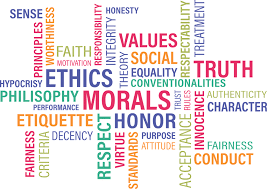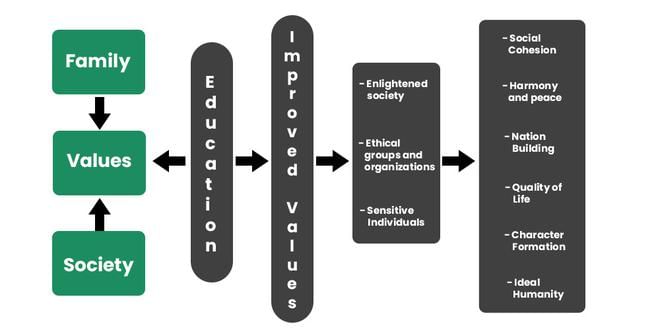UPSC Exam > UPSC Notes > UPSC Mains: Ethics, Integrity & Aptitude > Role of Society in Human Values
Role of Society in Human Values | UPSC Mains: Ethics, Integrity & Aptitude PDF Download
Role of Society in Human Values

- Religion: Religion plays a significant role in shaping human values by providing moral and ethical guidelines for behavior. It often emphasizes values such as compassion, honesty, respect, and justice, which influence individuals' interactions within society.
- Traditions and Customs: Traditions and customs help preserve cultural identity and pass down shared values through generations. They influence social behavior, interactions, and expectations, promoting values like respect for elders, hospitality, and community cooperation.
- Politics: Politics shapes societal values by influencing laws, policies, and governance systems. Political ideologies can affect issues such as equality, justice, and human rights, thus impacting the collective value system of a nation.
- Economy: The economy affects human values by determining access to resources, opportunities, and social mobility. Economic systems and practices often emphasize values like hard work, fairness, and innovation, which influence individuals' attitudes toward success and wealth distribution.
- Media: Media plays a crucial role in shaping human values by spreading information, influencing opinions, and setting social norms. It can promote positive values such as tolerance, empathy, and environmental consciousness, or it can perpetuate harmful stereotypes and behaviors.
- Civil Society: Civil society, through organizations and grassroots movements, contributes to the promotion of human values by advocating for social justice, equality, and human rights. It fosters collective action to address societal issues and improve community well-being.
- Local Community: The local community is essential in nurturing human values through social interactions and community-based activities. It provides a support system where individuals learn cooperation, empathy, responsibility, and respect for diversity.
- Leadership: Leadership plays a pivotal role in guiding the development and reinforcement of human values. Ethical leadership fosters trust, accountability, and fairness, setting an example for others to follow and influencing the moral direction of society.
Strengths of Society in Value Inculcation

- Stability and Harmony: A stable and harmonious society provides a conducive environment for the inculcation of values. When there is social peace, individuals are more likely to adopt and practice shared values that promote collective well-being.
- Diversity: The diversity within a society offers opportunities to learn and appreciate different cultures, beliefs, and perspectives. This diversity can strengthen values like tolerance, respect, and understanding, encouraging individuals to embrace inclusivity.
- Social Influence: Social influence from family, peers, and community members plays a significant role in shaping individual values. Norms and expectations within a society guide behavior and encourage adherence to common moral principles.
- Enforcement: Social institutions, such as law enforcement, education systems, and religious organizations, help enforce values by ensuring that actions align with societal standards. Laws and rules act as mechanisms to promote ethical behavior and discourage harmful practices.
- Credibility: A society’s credibility in upholding values is crucial for their effective inculcation. When institutions and leaders consistently model and uphold values, they gain trust and influence, which encourages individuals to adopt those values in their own lives.
Problems in the Role of Society
- Heterogeneity: The diversity and differences within society.
- Orthodoxy: The adherence to traditional beliefs and practices.
- Corruption: The presence of unethical behavior and dishonesty in societal structures.
- Misdirected: Situations where efforts or intentions are focused in the wrong direction.
- Introversion: Some individuals are naturally introverted, which can hinder their ability to internalize societal values effectively.
- Boomerang Effect: When society employs harsh or unreasonable methods to instill values, it often leads to misunderstanding and compels individuals to rebel against those values.
The document Role of Society in Human Values | UPSC Mains: Ethics, Integrity & Aptitude is a part of the UPSC Course UPSC Mains: Ethics, Integrity & Aptitude.
All you need of UPSC at this link: UPSC
|
78 videos|95 docs
|
FAQs on Role of Society in Human Values - UPSC Mains: Ethics, Integrity & Aptitude
| 1. What is the role of society in shaping human values? |  |
Ans.Society plays a crucial role in shaping human values through cultural norms, traditions, and collective experiences. It influences individual behavior and attitudes by providing a framework of acceptable conduct and ethical standards. This social environment nurtures values such as respect, integrity, and empathy, which are essential for harmonious coexistence.
| 2. How do human values contribute to social cohesion? |  |
Ans.Human values contribute to social cohesion by fostering mutual respect, understanding, and cooperation among individuals. When members of a society share common values, it creates a sense of belonging and unity, reducing conflicts and promoting collaboration. This collective adherence to values strengthens community bonds and enhances social stability.
| 3. Can human values change over time within a society? |  |
Ans.Yes, human values can change over time as societies evolve due to various factors such as globalization, technological advancements, and shifts in cultural dynamics. As new ideas and practices emerge, traditional values may be reinterpreted, leading to the adoption of new ethical standards and behaviors that reflect contemporary realities.
| 4. What role do educational institutions play in promoting human values? |  |
Ans.Educational institutions play a vital role in promoting human values by integrating ethical teachings into their curricula and fostering an environment of respect and inclusivity. Through discussions, activities, and community engagement, schools and colleges instill values like honesty, responsibility, and compassion, shaping the moral character of students.
| 5. How can individuals influence the values of their society? |  |
Ans.Individuals can influence the values of their society through active participation in community service, advocacy, and by being role models in their personal and professional lives. By demonstrating strong ethical principles and engaging in dialogue about important social issues, individuals can inspire others and contribute to the evolution of collective values within their communities.

|
Explore Courses for UPSC exam
|

|
Signup for Free!
Signup to see your scores go up within 7 days! Learn & Practice with 1000+ FREE Notes, Videos & Tests.
Related Searches
















